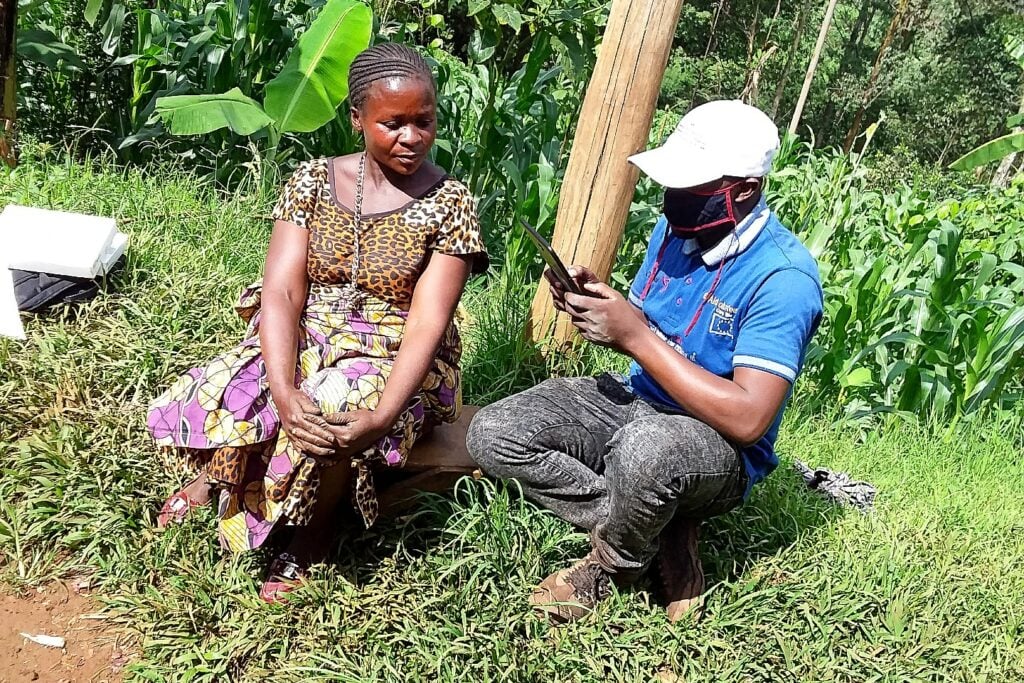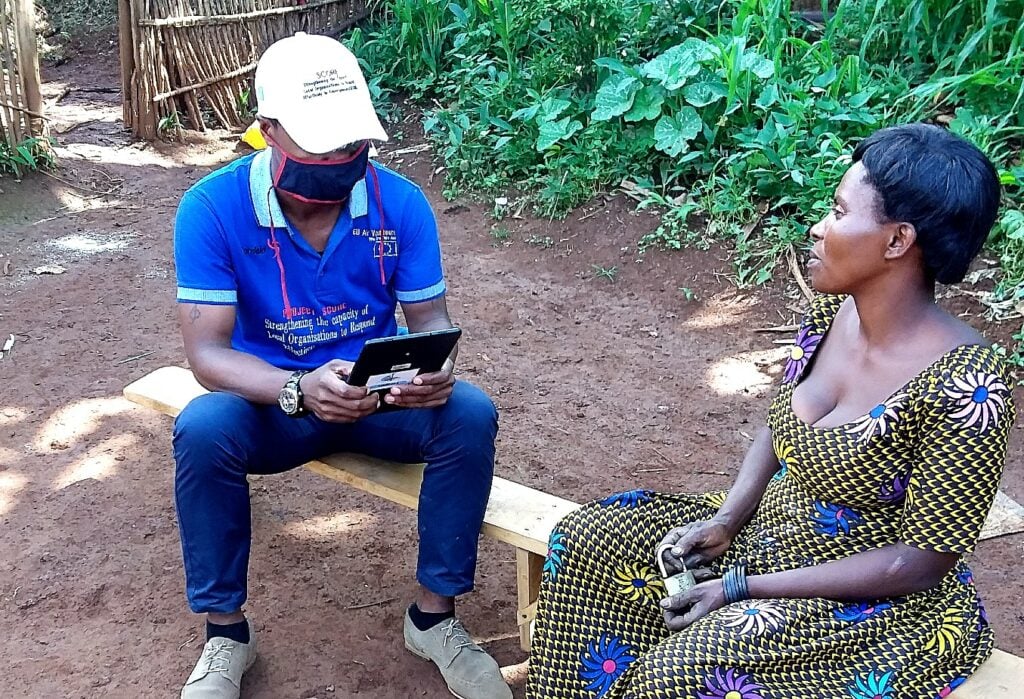“Local responders know the context best. They need to be able to access funds more easily and to save lives more efficiently”, says Cordaid’s Thierry Metre in Bukavu, eastern DRC. With EU funding, this localisation of humanitarian assistance is exactly what Cordaid is investing in. And it pays off.

“Before, we would never have been able to be among the last implementing candidates of a big World Food Programme (WFP) tender. Finally, we are entering the big league,” says Oscar Kalimba. He heads the Programme d’Actions pour le Développement des Bases Unies (Padebu). As such, he represents a number of local aid organisations in the Bunyakiri area of South Kivu, in the eastern part of the Democratic Republic of Congo.
Ownership, leadership, and direct funding
Eastern DRC is one of the world’s ‘hot spots’ when it comes to humanitarian assistance and international development aid. The main aim of the international community is to assist the population in addressing, overcoming, and preventing armed conflict and natural disasters.
“In the first days and weeks, when people are dying or trying to survive, we can’t just always wait for international aid agencies to come and act. Local aid workers already do most of the work. But they need the tools and the funding to act faster and more effectively.”
Increasingly, aid professionals in Kivu, just like in any major crisis area, have been claiming a bigger role in implementing and organizing this assistance. They want ownership, leadership. And direct funding.
In 2016, the international community committed itself to make this happen. Securing more support and funding tools to national and local responders, was one of many commitments of The Grand Bargain that was launched during that year’s World Humanitarian Summit.
Acting faster and more efficiently
By ‘before’, Oscar means before a number of his staff participated in an intensive training schedule. This was part of a consortium initiative in four African countries to strengthen the capacity of local organisations to respond effectively in emergencies (SCORE). This EU-funded project is led by Trocaire in collaboration with Cordaid and 12 civil society organisations in Rwanda, Ethiopia, Sierra Leone, and DRC Congo. Padebu is one of them.
“In South Kivu, SCORE capacity training sessions focused on emergency preparedness planning, on protection mainstreaming, on making fast and accurate needs assessments using digital data collection. But also on cash transfer in isolated areas where monetary systems are lacking,” explains Thierry Metre who acts as SCORE’s focal point in DR Congo.
“It not only allows local humanitarians to act faster and more efficiently when disasters strike. It also strengthens their position in the international funding and aid arena,” he continues.
Going digital
Christian Ntakobajira from Padebu participated in one of these five-day SCORE crash courses. Being an ICT expert he took the one in digital data collection. “It made a lot of difference,” he says. “Assessing needs and collecting other data used to be paperwork. Today 5 of us are using tablets. We go from place to place, conduct our surveys, and enter data on the spot. It works twice as fast, data are better protected and more accurate,” he says.

SCORE did more than organizing the workshops, provide tablets, and new software. “We now also have our own server, allowing us to store, save and manage all Padebu data,” Christian continues.
“As an accountant, my job is to make sure that every cent is spent according to the rules. Nobody can fool me. Today even less so than before.”
Going digital also has it’s downsides. But they don’t deter Christian and his colleagues. “Often, we have no electricity or internet coverage. But power banks and portable modems solve those problems by up to 80%. And walking around with a tablet can be tricky in terms of security. But so far, no incidents occurred.”
‘This makes us more competitive’
Having this digital data infrastructure and expertise is a huge step forward for Padebu. In fact, it works like a flywheel.
“It makes us more competitive,” Oscar maintains. “Our analysts and experts can download and use data entered in the field almost immediately. This significantly improves our monitoring, evaluation, and reporting capacities, both in rapidity and in quality. It strengthens our position in the international funding arena. And, not unimportantly, reducing paperwork has environmental benefits.”
“We can now better negotiate, be it with international donor agencies, with governmental agencies, or with multilateral agencies.”
As for the WFP tender, Oscar and his staff keep their fingers crossed. “But being part of the shortlisted candidates is already a step forward,” he concludes.
Cash transfer programming
Justine Babunga, an accountant working for Caritas Bukavu, also benefited from SCORE. She took a course in cash transfer programming.
Increasingly, humanitarians opt for cash assistance. Promoting this is also one of The Grand Bargain’s ambitions. It helps deliver greater choice and empowerment to affected people and strengthens local markets. But so far, this tool remains underutilized.
“We were versed in all the technicalities and the different stages of cash transfer programming”, explains Justine. “From preparation and planning to market analyses, monitoring, and evaluation.”
‘Nobody can fool me, even less than before’
Market analyses are an important and delicate part of the work. The cash you distribute among people who are coping with life-threatening hardship needs to be market-conform. And local markets in crisis areas are very volatile, hence the need for constant checks.
“We now know better how to do that. And also to collaborate more efficiently with food-producing cooperatives and banks. They play an important role in making cash transfer work as a tool in humanitarian assistance,” Justine Babunga continues. “If everything is in place, we use mobile banking. If financial services are lacking, we still distribute cash manually,” she says.
“Often, we have no electricity or internet coverage. But power banks and portable modems solve those problems by up to 80%.”
Miss Justine mostly works in the Caritas office in the city of Bukavu, while the actual cash assistance takes place in the field. “The SCORE training, with its theoretical and its practical module in the field, gave me very precise knowledge of how things work. As an accountant, my job is to make sure that every cent is spent according to the rules. Nobody can fool me. Today even less so than before,” she happily concludes.
Moving towards the front seat
Summing up SCORE’s results, Oscar Kalimba comes with a list of improvements. “We professionalized our financial administration and accountability mechanisms, developed emergency preparedness plans, set up our own emergency response team, and improved our cash transfer programming.”
“Also, we now have HR policies and zero-tolerance codes of conduct when it comes to gender-based violence, child abuse, corruption, and other issues,” he goes on. “Part of our data collection is now digital. We even have our own server. We can now better negotiate, be it with international donor agencies, with governmental agencies, or with multilateral agencies.”
SCORE training sessions might not put local humanitarian organisations like Padebu and Caritas Bukavu in the front seat of big humanitarian responses. But they do equip them to move forward and claim a bigger role, on equal footing with INGOs.
More direct funding for local NGOs
There are still many hurdles, barring local NGOs from that front seat. Lack of direct funding is a major one. This is where the shoe pinches, according to Metre. Local responders increase their capacity to respond, but they still often lack the means to put it into practice.
“Here in Eastern Congo, armed conflicts, epidemics, and natural disasters increased in frequency and amplitude since 2017. In the first days and weeks, when people are dying or trying to survive, we can’t just always wait for international aid agencies to come and act. Local aid workers already do most of the work. But they need the tools and the funding to act faster and more effectively.”
We, local humanitarians who know the cultural, social, political, and geographical context best, need to be able to rapidly access crisis areas, assess needs, and save lives ourselves. SCORE has increased the capacity to do all this. But local responders need more direct funding to actually roll out and implement the emergency plans and operations more autonomously. To learn, improve, and to act.”
Funded by the European Union, as a part of its EU Aid Volunteer Initiative, SCORE is a consortium project led by Trocaire in collaboration with Cordaid and 12 civil society organisations in DRC, Rwanda, Ethiopia, and Sierra Leone.